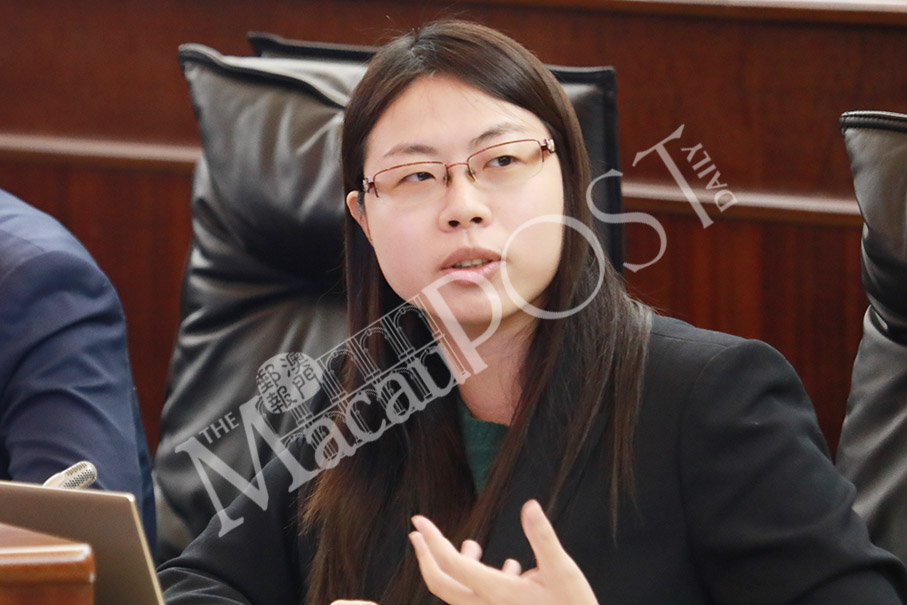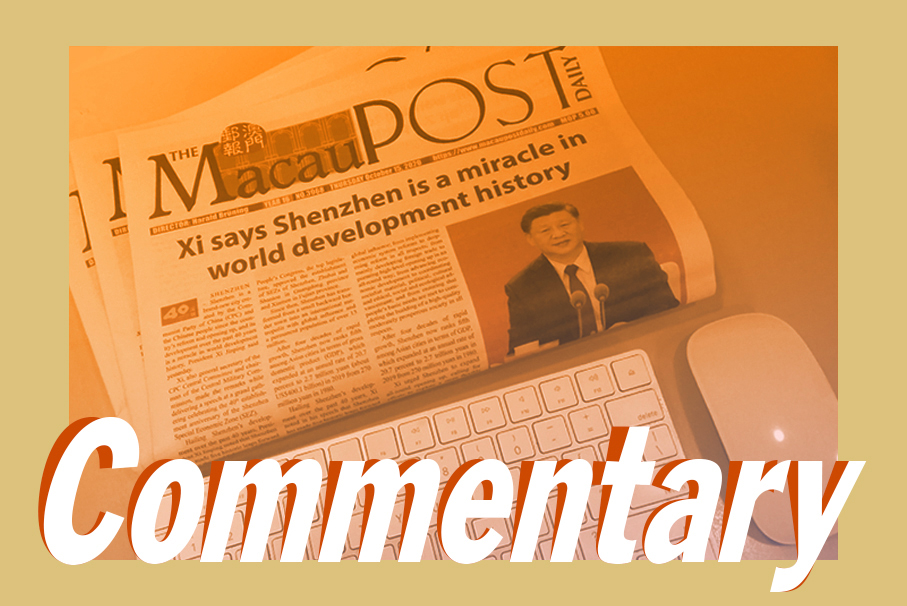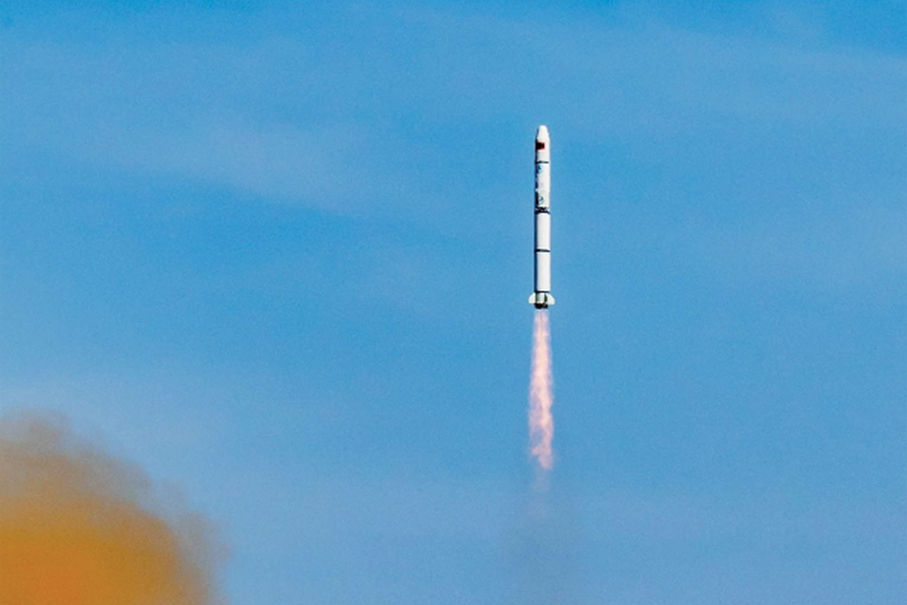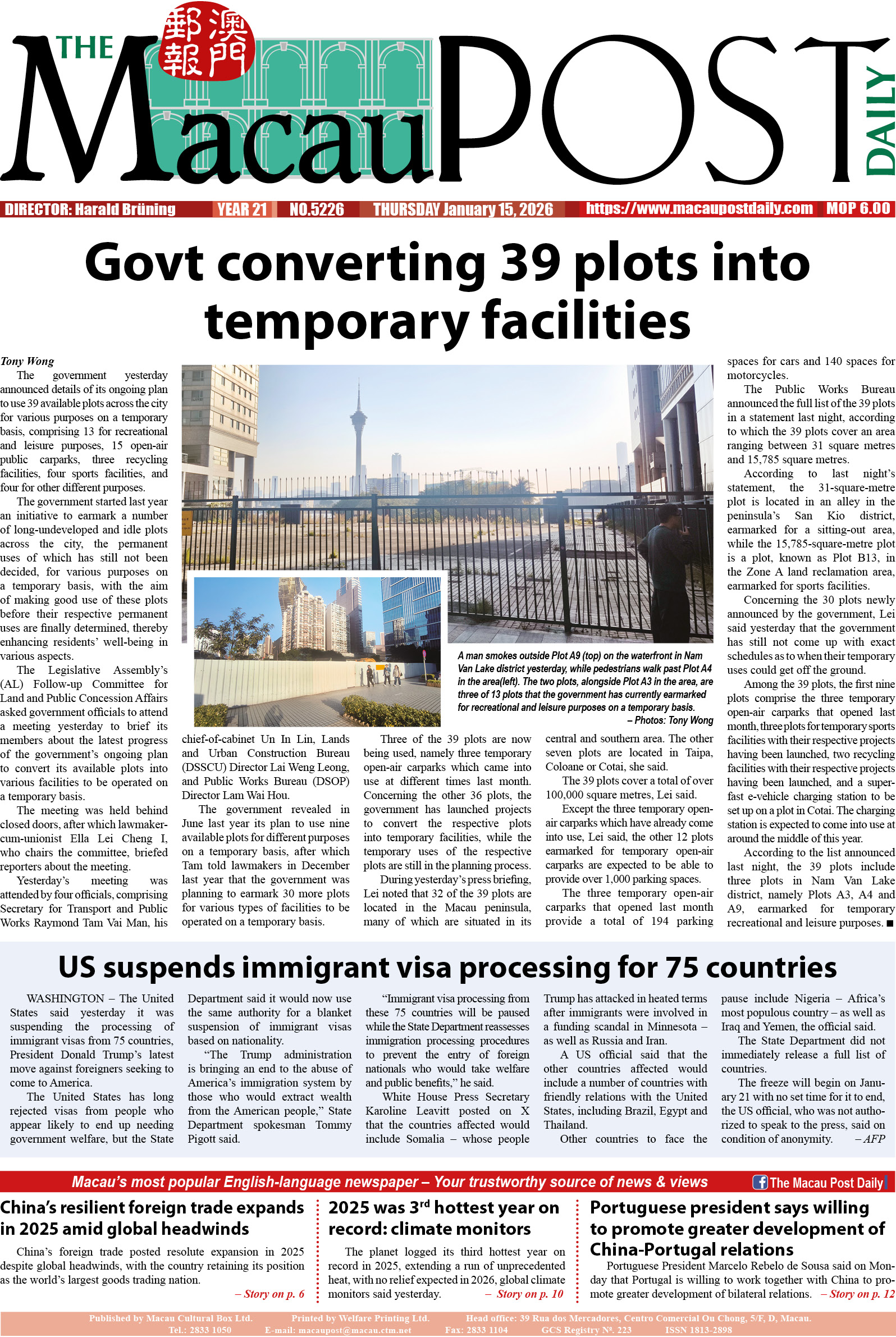Transport and Public Works Secretary Raimundo do Rosario said yesterday he believed that most residents would be able to afford the government-proposed increase in public bus fares.
Rosario attended a plenum in the legislature’s hemicycle which discussed a debate motion by directly-elected lawmaker-cum-unionist Ella Lei Cheng I on the issue.
The legislature passed Lei’s debate motion in November, which questioned whether the government was taking into account that its proposal to increase public bus fares would adversely impact its existing traffic policy of encouraging residents to use public transport.
The Transport Bureau (DSAT) presented its proposal on the bus fare increase to the Traffic Consultative Council during a regular meeting of the government-appointed body in September last year.
The current bus fare system came into force in late 2008, according to which bus passengers pay a discounted rate when using
Macau Pass.
Under the current bus fare system, all passengers pay fares ranging from 2.8 patacas to 6.4 patacas – depending on the bus route they are on – when using cash, while they only pay from two to three patacas when using Macau Pass.
Currently, pupils and students (holding the Student Macau Pass) pay one pataca for all routes, while senior citizens and the disabled (holding Macau Pass) pay 30 avos (cents) on all routes.
For the government-planned bus fare increase, the bureau proposes that all passengers pay six patacas on all routes. The bureau also proposes that passengers using Macau Pass pay three patacas on regular routes and four patacas on express routes.
The bureau proposes that pupils, students, senior citizens and the disabled will get different discounts. The bureau proposes that senior citizens will pay 1.50 patacas during peak hours from 8 a.m. to 9 a.m. and from 6 p.m. to 7 p.m., while the rest of the day they get to travel for free.
The bureau also proposes that pupils and students pay 1.50 patacas for regular routes and two patacas for express routes.
According to the bureau, during the “second phase” of the proposed bus fare increase, non-locals would pay fares different to local residents’ fares when using Macau Pass. The bureau proposes that non-locals will have to pay four patacas for regular routes and five
patacas for express routes.
Controversially, the category of non-locals would not only comprise visitors but also non-resident workers (popularly known as blue-card holders). Migrant worker groups and social activists have complained about the proposal which would discriminate against imported labour – most of them low-income workers.
Nearly two thirds of Macau’s blue-card holders are mainlanders. The number of imported labour stood at 178,492 at the end of November, according to the Labour Affairs Bureau (DSAL).
The government has said that the planned bus fare hikes are proposals that can still be changed.
The government has also said that it still does not have a timetable as to when a planned increase in public bus fares will be implemented.
During yesterday’s plenary session, Rosario noted that the operating cost of the city’s public bus service amounts to 6.60 patacas per bus passenger.
Rosario noted that the city’s bus fares have not been changed for almost a decade.
Pointing out that passengers using Macau Pass currently only need to pay two patacas (for routes travelling within the peninsula), Rosario said that the proposed fares of three patacas (for regular routes when using Macau Pass) would still be less than the half of the operating cost of 6.60 patacas per passenger.
According to Rosario, currently passengers are only paying 30 percent of the bus service operating cost while the remaining 70 percent is borne by the government. He said that the 70 percent paid by the government is too high.
Rosario said he believed that most residents could afford the proposed bus fare increase.
Rosario reaffirmed that the city’s public bus fares needed to be raised as they have not been adjusted for almost a decade.
Rosario admitted that “changes to anything” would be controversial in civil society, adding that the government would adjust public bus fares whenever necessary.
DSAT Director Kelvin Lam Hin San said during yesterday’s plenum that the city’s public buses ran 50,000 to 60,000 kilometres per day in 2011, while they currently run more than 140,000 kilometres per day.
According to the bureau’s website, the city’s three public bus operators had between them 907 public buses at the end of September.
Lam said that the salary expenditure of the city’s public bus drivers has been consistently rising. He noted that the existing 1,300 public bus drivers each have an average monthly salary of 28,000 patacas and that their total salary expenditure currently amounts to 36 million patacas per month, accounting for 60 percent of the total operating cost of the three public bus operators. He added that the salary expenditure of bus drivers only occupied 40 percent of the total operating cost in 2011.
According to advertisements from the three bus operators, they currently offer a newly-hired bus driver a basic monthly salary of around 21,000 patacas.

Secretary for Transport and Public Works Raimundo do Rosario (right) gestures during yesterday’s plenary session in the legislature’s hemicycle as Transport Bureau (DSAT) Director Kelvin Lam Hin San looks on. Photos: MPDG

Directly-elected lawmaker-cum-unionist Ella Lei Cheng I addresses yesterday’s plenum about her debate motion.







